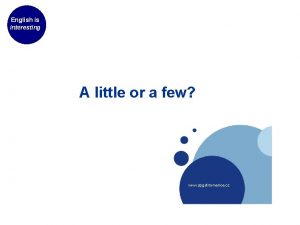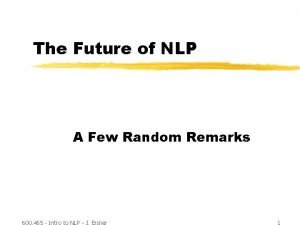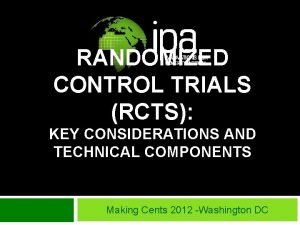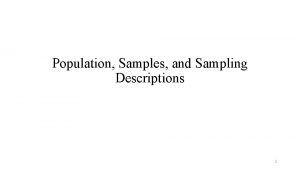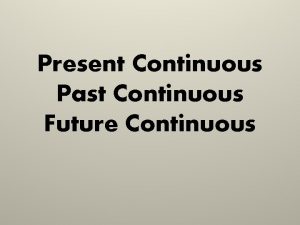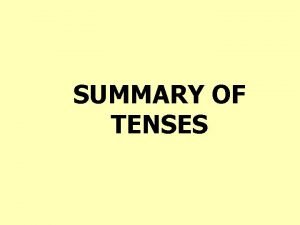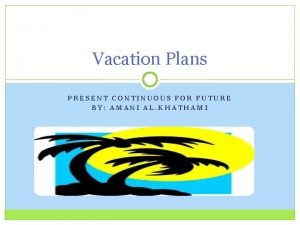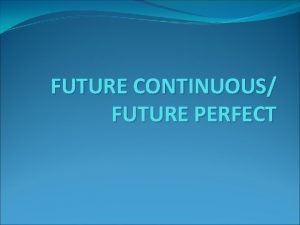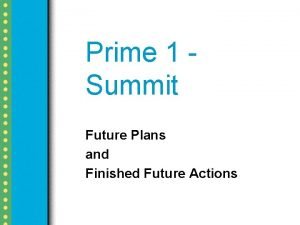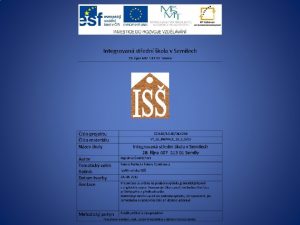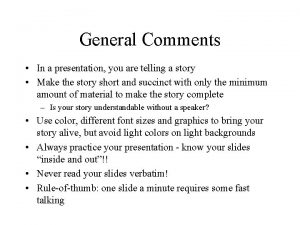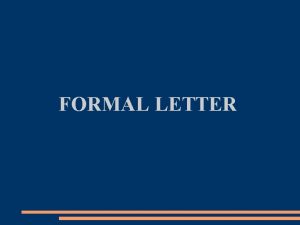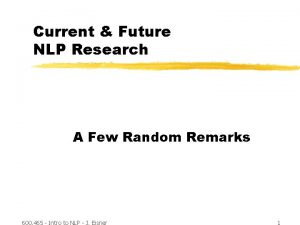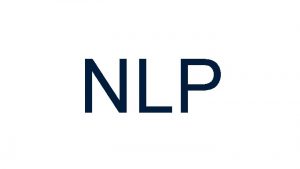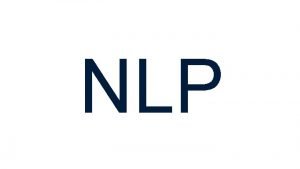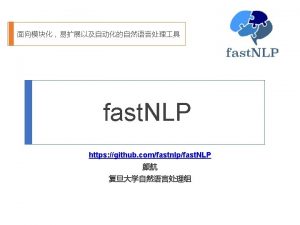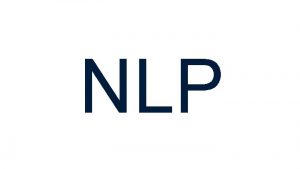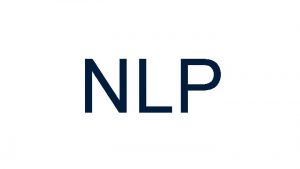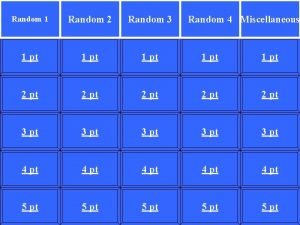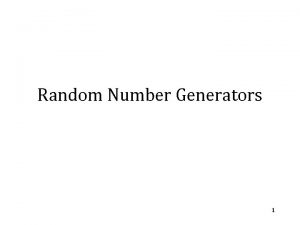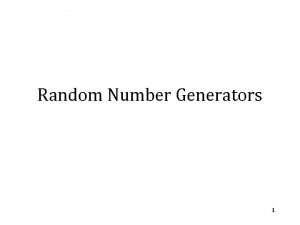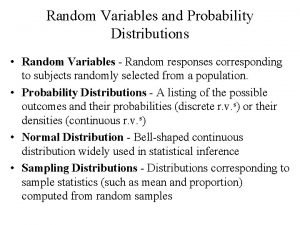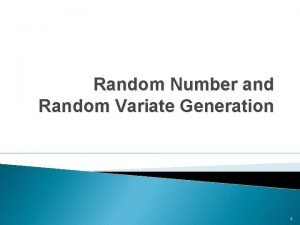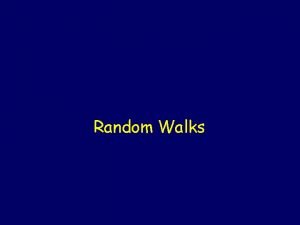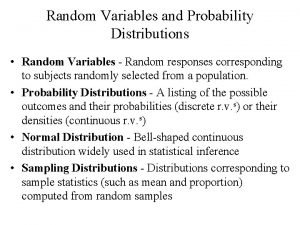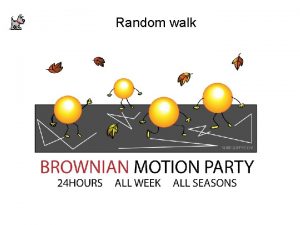The Future of NLP A Few Random Remarks




















- Slides: 20

The Future of NLP A Few Random Remarks 600. 465 - Intro to NLP - J. Eisner 1

Computational Linguistics § We can study anything about language. . . § § 1. 2. 3. 4. Formalize some insights Study the formalism mathematically Develop & implement algorithms Test on real data 600. 465 - Intro to NLP - J. Eisner 2

The Big Questions § What are the right formalisms to encode linguistic knowledge? § Discrete knowledge: what is possible? § Continuous knowledge: what is likely? § How can we compute efficiently with these formalisms? § Or find approximations that work pretty well? 600. 465 - Intro to NLP - J. Eisner 3

Reprise from Lecture 1: What’s hard about this story? John stopped at the donut store on his way home from work. He thought a coffee was good every few hours. But it turned out to be too expensive there. § These ambiguities now look familiar § You now know how to solve some: § Word sense disambiguation § PP attachment § You can imagine how to solve others: § Which NP does “it” refer to? (pronoun reference resolution) § Could use techniques from word-sense disambig. or language modeling § Others still seem beyond the state of the art: § Anything that requires semantics or reasoning 600. 465 - Intro to NLP - J. Eisner 4

Some of the Active Research § Syntax: It’s converging, but still messy § New: Attach probabilities to “deep structure” of syntax § Phonology: Formalism under hot development § Speech: § § Better language modeling (predict next word) Better models of acoustics, pronunciation Emotional speech, kids/old folks, bad audio, conversation Adaptation to particular speakers and dialects § Translation models and algorithms § Semantic theories and connection to AI – use stats? § Too many semantic phenomena. Really hard to determine and disambiguate possible meanings. 600. 465 - Intro to NLP - J. Eisner 5

Some of the Active Research § All of these areas have learning problems attached. § We’re really interested in unsupervised learning. § § How How to to learn FSTs and their probabilities? CFGs? Deep structure? good word classes? translation models? 600. 465 - Intro to NLP - J. Eisner 6

Semantics Still Tough § “The perilously underestimated appeal of Ross Perot has been quietly going up this time. ” § § Underestimated by whom? Perilous to whom, according to whom? “Quiet” = unnoticed; by whom? “Appeal of Perot” “Perot appeals …” § a court decision? § to someone/something? (actively or passively? ) § “The” appeal § “Go up” as idiom; and refers to amount of subject § “This time” : meaning? implied contrast? 600. 465 - Intro to NLP - J. Eisner 7

Deploying NLP § Speech recognition and IR have finally gone commercial over the last few years. § But not much NLP is out in the real world. § What killer apps should we be working toward? § Resources: § Corpora, with or without annotation § Word. Net; morphologies; maybe a few grammars § Perl, Java, etc. don’t come with NLP or speech modules, or statistical training modules. § But there are research tools available: § § § Finite-state toolkits Machine learning toolkits (e. g. , WEKA) Annotation tools (e. g. , GATE) Emerging standards like Voice. XML Dyna – a new programming language being built at JHU 600. 465 - Intro to NLP - J. Eisner 8

Deploying NLP § Sneaking NLP in through the back door: § Add features to existing interfaces § § § “Click to translate” Spell correction of queries Allow multiple types of queries (phone number lookup, etc. ) IR should return document clusters and summaries From IR to QA (question answering) Machines gradually replace humans @ phone/email helpdesks § Back-end processing § Information extraction and normalization to build databases: CD Now, New York Times, … § Assemble good text from boilerplate § Hand-held devices § Translator § Personal conversation recorder, with topical search 600. 465 - Intro to NLP - J. Eisner 9

IE for the masses? “In most presidential elections, Al Gore’s detour to California today would be a sure sign of a campaign in trouble. California is solid Democratic territory, but a slip in the polls sent Gore rushing back to the coast. ” 600. 465 - Intro to NLP - J. Eisner 10

IE for the masses? “In most presidential elections, Al Gore’s detour to California today would be a sure sign of a campaign in trouble. California is solid Democratic territory, but a slip in the polls sent Gore rushing back to the coast. ” kind About PLL “polls” name AG Move “Al Gore” Move date=10/31 Location kind CA “California” name 600. 465 - Intro to NLP - J. Eisner “territory” property path=down date<10/31 “Democratic” name “coast” 11

IE for the masses? § “Where did Al Gore go? ” § “What are some Democratic locations? ” § “How have different polls moved in October? ” name “Al Gore” Location About AG Move date=10/31 kind CA “California” name 600. 465 - Intro to NLP - J. Eisner PLL kind “territory” property “polls” Move path=down date<10/31 “Democratic” name “coast” 12

IE for the masses? § § § Allow queries over meanings, not sentences Big semantic network extracted from the web Simple entities and relationships among them Not complete, but linked to original text Allow inexact queries § Learn generalizations from a few tagged examples § Redundant; collapse for browsability or space 600. 465 - Intro to NLP - J. Eisner 13

Dialogue Systems § § Games Command-control applications “Practical dialogue” (computer as assistant) The Turing Test 600. 465 - Intro to NLP - J. Eisner 14

Turing Test Q: Please write me a sonnet on the subject of the Forth Bridge. A [either a human or a computer]: Count me out on this one. I never could write poetry. Q: Add 34957 to 70764. A: (Pause about 30 seconds and then give an answer) 105621. Q: Do you play chess? A: Yes. Q: I have my K at my K 1, and no other pieces. You have only K at K 6 and R at R 1. It is your move. What do you play? A: (After a pause of 15 seconds) R-R 8 mate. 600. 465 - Intro to NLP - J. Eisner 15

Turing Test Q: In the first line of your sonnet which reads “Shall I compare thee to a summer’s day, ” would not “a spring day” do as well or better? A: It wouldn’t scan. Q: How about “a winter’s day”? That would scan all right. A: Yes, but nobody wants to be compared to a winter’s day. Q: Would you say Mr. Pickwick reminded you of Christmas? A: In a way. Q: Yet Christmas is a winter’s day, and I do not think Mr. Pickwick would mind the comparison. A: I don’t think you’re serious. By a winter’s day one means a typical winter’s day, rather than a special one like Christmas. 600. 465 - Intro to NLP - J. Eisner 16

TRIPS System 600. 465 - Intro to NLP - J. Eisner 17

TRIPS System 600. 465 - Intro to NLP - J. Eisner 18

Dialogue Links (click!) § Turing's article (1950) § Eliza (the original chatterbot) § Weizenbaum's article (1966) § Eliza on the web - try it! § Loebner Prize (1991 -2001), with transcripts § Shieber: “One aspect of progress in research on NLP is appreciation for its complexity, which led to the dearth of entrants from the artificial intelligence community - the realization that time spent on winning the Loebner prize is not time spent furthering the field. ” § TRIPS Demo Movies (1998) § Gideon Mann’s short course next term 600. 465 - Intro to NLP - J. Eisner 19

JHU’s Center for Language and Speech Processing (CLSP) § One of the biggest centers for NLP/speech research § Core faculty: § § Jason Eisner & David Yarowsky (CS) Bill Byrne, Fred Jelinek, & Sanjeev Khudanpur (ECE) Bob Frank & Paul Smolensky (Cognitive Science) Others loosely associated – machine learning, linguistics, etc. § Lots of grad students § Focus is on core grammatical and statistical approaches § Many current areas of interest, including multi-faculty projects on machine translation, speech recognition, optimality theory § More coursework, reading groups § Speaker series: Tuesday 4: 30 when classes are in session 600. 465 - Intro to NLP - J. Eisner 20
 Little a little few a few
Little a little few a few Random remarks
Random remarks Fill in a few a little
Fill in a few a little Use these words to complete the sentences
Use these words to complete the sentences Litle a
Litle a Future perfect simple continuous
Future perfect simple continuous See future continuous
See future continuous Random assignment vs random sampling
Random assignment vs random sampling Random assignment vs random selection
Random assignment vs random selection Past continuous future
Past continuous future 1 2 3 kondicional u engleskom jeziku
1 2 3 kondicional u engleskom jeziku Present past future
Present past future Verbal times
Verbal times Present progressive for plans
Present progressive for plans Future perfect future continuous exercises
Future perfect future continuous exercises Future plans and finished future actions
Future plans and finished future actions Future nurse programme
Future nurse programme Perfect future continuous tense
Perfect future continuous tense Future vs future perfect
Future vs future perfect Report card remarks
Report card remarks Example of a formal letter
Example of a formal letter
